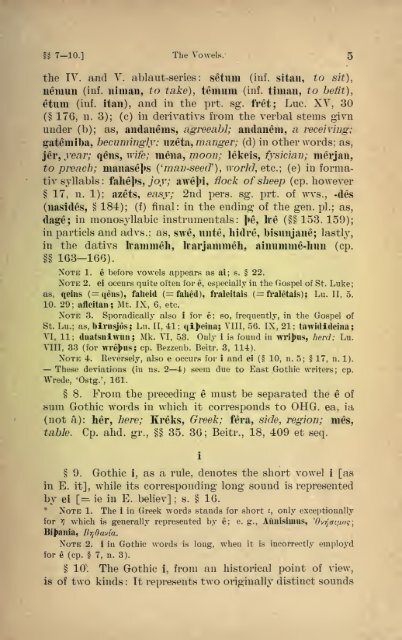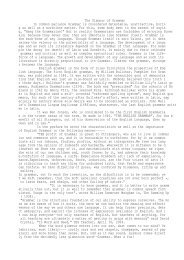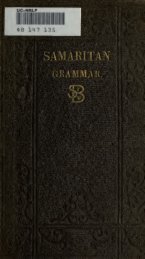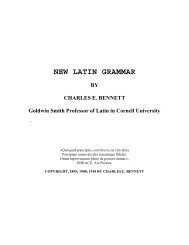A Gothic grammar with selections for reading and a ... - EducationNest
A Gothic grammar with selections for reading and a ... - EducationNest
A Gothic grammar with selections for reading and a ... - EducationNest
Create successful ePaper yourself
Turn your PDF publications into a flip-book with our unique Google optimized e-Paper software.
710.] The Vowels. 5<br />
the IV. <strong>and</strong> V. ablaut-series: setum (inf. sitan, to sit),<br />
nemim (inf. niinaii, to take), temum (inf. timan, to befit),<br />
etum (inf. itan), <strong>and</strong> in the prt. sg. fret; Luc. XV, 30<br />
( 176, n. 3); (c) in derivative from the verbal stems givn<br />
under (b); as, aiidanems, agreeabl; <strong>and</strong>anem, a receiving;<br />
gatemiba, becumingly; uzeta, manger; (d) in other words; as,<br />
jer, year; qens, wife; niena. moon; lekeis, fysician; merjan,<br />
to preach; manaseps ('man-seed 1<br />
}, world, etc.; (e) in <strong>for</strong>niativsyllabls:<br />
fahe)s, joy; awe]>i, flock of sheep (cp. however<br />
17, u. 1); azets, easy; 2nd pers. sg. prt. of wvs., -des<br />
(nasides, 184); (f) final: in the ending of the gen. pi.; as,<br />
dage; in monosyllabic iiistrumentals : J>e, Ire ( 153. 159);<br />
in particle <strong>and</strong> advs.; as, swe, unte, hidre, bisunjane; lastly,<br />
in the dativs ham inch, Irarjammeh, ainumme-him (cp.<br />
163166).<br />
NOTE 1. e be<strong>for</strong>e vowels appears as ai; s. 22.<br />
NOTE 2. ei occurs quite often <strong>for</strong> e, especially in the Gospel of St. Luke;<br />
as, qeins (=qens), faheid (= failed), fraleitais ( fraletais); Lu. II, 5.<br />
10. 29; afleitan; Mt. IX, 6, etc.<br />
NOTE 3. Sporadically also i <strong>for</strong> e; so, frequently, in the Gospel of<br />
St. Lu.; as, bimbos; Lu. II, 41: qi]>ema; VIII, 56. IX, 21; tawidideiua;<br />
VI, 11; duatsniwnn; Mk. VI, 53. Only i is fouud in wrijms, herd; Lu.<br />
VIII, 33 (<strong>for</strong> wrejws; cp. Bezzenb. Beitr. 3, 114).<br />
NOTE 4. Reversely, also e occurs <strong>for</strong> i <strong>and</strong> ei ( 10, n. 5; 17, n. 1).<br />
These deviations (in ns. 2 4) seem due to East <strong>Gothic</strong> writers; cp.<br />
Wrede, 'Ostg.', 161.<br />
8. From the preceding e must be separated the e of<br />
sum <strong>Gothic</strong> words in which it corresponds to OHG. ea, ia<br />
(not a): her, here; Kreks, Greek; fera, side, region; mes,<br />
table. Cp. ahd. gr., 35. 36; Beitr., 18, 409 et seq.<br />
i<br />
9. <strong>Gothic</strong> i, as a rule, denotes the short vowel i [as<br />
in E. it], while its corresponding long sound is represented<br />
by ei [ ie in E. believ] ; s. 16.<br />
NOTE 1. The i in Greek words st<strong>and</strong>s <strong>for</strong> short , only exceptionally<br />
<strong>for</strong> y which is generally represented by e; e. g., Ai'misimus, 'Ovr}ffi,'j.o$;<br />
Bipnuia, llrfiwia.<br />
NOTE 2. i in <strong>Gothic</strong> words is long, when it is incorrectly employd<br />
<strong>for</strong> e (cp. 7, n. 3).<br />
10. The <strong>Gothic</strong> i, from an historical point of view,<br />
is of two kinds : It represents two originally distinct sounds











